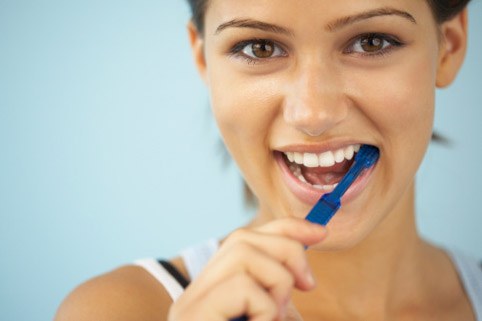Tooth powder: what is it and what does it consist of?
The first mention of dental powders dates back to the second Millennium BC. Our ancestors received dentifrices, crushing egg shells, bones and horns of animals, rust, pumice, gypsum, coral and oyster shell. In the XVII century tooth powder made from ground salt, and later salt was replaced with chalk. Modern tooth powder consists of fine chalk and refreshing tool – fragrances. Increasingly replaced the chalk comes in white clay.
The benefits of tooth powder
High-quality, natural tooth powder is useful for the oral cavity. The main thing is to use powder made from natural ingredients, apply it on a brush with soft bristles and use 1-2 times a week.
Tooth powder gently removes food residue, strengthens tooth enamel, normalizes the acid-alkaline balance in the oral cavity, reduces the likelihood of developing cavities, prevents gum disease and loosens Tartar. With regular use tooth powder decreases swelling and bleeding gums, plaque disappears from cigarettes and coffee, restores natural color of teeth.
Whitening dentifrices can be used to perform bleaching applications. For the appliqué should be applied to the teeth, a thick paste from the powder, to sustain its 10-15 minutes, massage and rinse thoroughly with water.
In addition, the tooth powder is easy to use. To brush your teeth, you only need to apply powder on the moistened toothbrush and you can begin hygiene.
Disadvantages of tooth powder
Unlike toothpaste, the powder is stored in non-hermetic containers, so he quickly picks up moisture and become contaminated, especially if the user puts into it a damp toothbrush. The risk of propagation of pathogenic bacteria in the tooth powder is much higher than in airtight pasta.
Powder which includes precipitated chalk, has an abrasive effect on the enamel of the teeth. People who abuse powder, the enamel eventually becomes thinner, teeth become sensitive and painfully react to hot and cold foods.
In the bleaching tooth powders included soda and granulated chemicals that are harmful to the digestive system. Such powders are not recommended to breathe in and swallow while brushing your teeth, since they are deposited on the surface of the stomach, the walls of the esophagus and the mucosa of the lungs, forming a dense film. Children use whitening tooth powders is contraindicated.
So, should you use tooth powder?
Brush your teeth with tooth powder can and should be. The key is to use the powder correctly, following these simple rules. And then a healthy, strong, white teeth will be the subject of your pride and the key to a beautiful smile.
Before using toothpaste, consult your dentist. Refrain from using it if the enamel is delicate and sensitive to cold and hot food. Choose for yourself the best quality powder, consisting of white or pink clay, extracts of herbs and volcanic minerals. Do not overdo tooth powder, use it 1-2 times a week. Don't let to use tooth powder to children.
